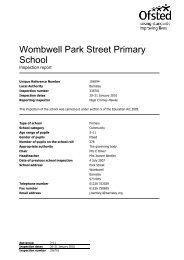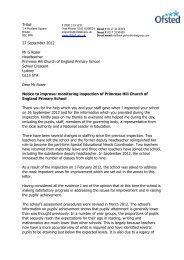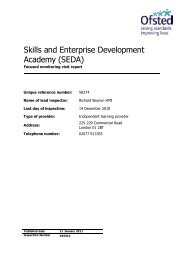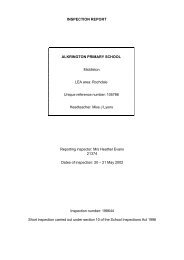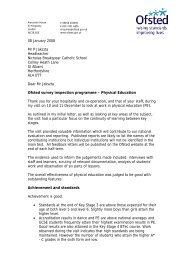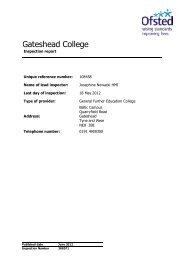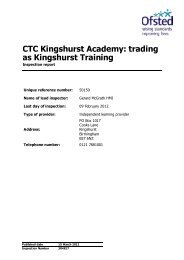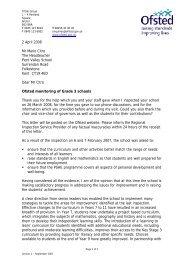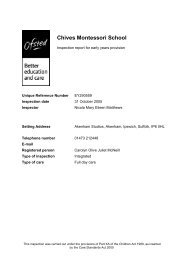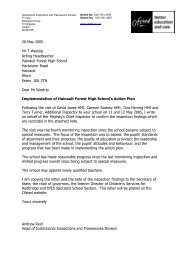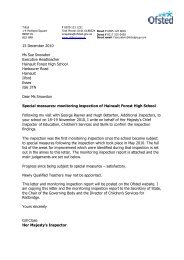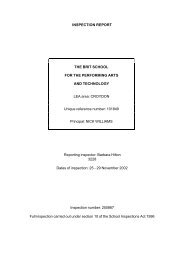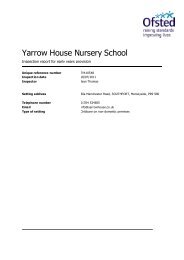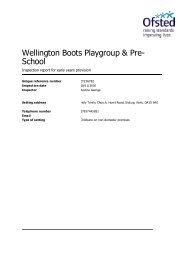18 October 2006 Mr D Tristram Headteacher The ... - Ofsted
18 October 2006 Mr D Tristram Headteacher The ... - Ofsted
18 October 2006 Mr D Tristram Headteacher The ... - Ofsted
Create successful ePaper yourself
Turn your PDF publications into a flip-book with our unique Google optimized e-Paper software.
Alexandra House<br />
33 Kingsway<br />
London<br />
WC2B 6SE<br />
<strong>18</strong> <strong>October</strong> <strong>2006</strong><br />
<strong>Mr</strong> D <strong>Tristram</strong><br />
<strong>Headteacher</strong><br />
<strong>The</strong> Kingswood School<br />
Gainsborough Road<br />
Corby<br />
Northamptonshire<br />
NN<strong>18</strong> 9NS<br />
Dear <strong>Mr</strong> <strong>Tristram</strong><br />
<strong>Ofsted</strong> survey inspection programme – Modern languages (ML)<br />
Thank you for your hospitality and co-operation and that of your staff and<br />
students during my visit on 4-5 <strong>October</strong> <strong>2006</strong> to look at work in modern<br />
languages.<br />
As outlined in my initial letter, as well as looking at key areas of the subject,<br />
the visit had a particular focus on how speaking skills are developing, as well<br />
as how information communication technology (ICT) is being used to support<br />
the development of languages generally. It also looked at where you are in<br />
reaching the benchmarks for provision in Key Stage 4.<br />
<strong>The</strong> visit provided valuable information which will contribute to our national<br />
evaluation and reporting. Published reports are likely to list the names of the<br />
contributing institutions, but individual institutions will not be identified in the<br />
main text. All feedback letters will be published on the <strong>Ofsted</strong> website at the<br />
end of each half-term.<br />
<strong>The</strong> evidence used to inform the judgements made included: interviews with<br />
staff and students, scrutiny of school and departmental documentation,<br />
analysis of students’ work and observation of five lessons.<br />
<strong>The</strong> overall effectiveness of ML was judged to be good.<br />
Achievement and standards<br />
Achievement is good.<br />
T 08456 404045<br />
F 020 7421 6644<br />
www.ofsted.gov.uk<br />
� Standards at the end of Key Stage 3 improved in <strong>2006</strong> although they<br />
remain somewhat below the national expectations for the number of<br />
students gaining a Level 5 plus. However, there was a marked
improvement in the numbers of students gaining a Level 6, particularly<br />
for boys where the figure was broadly average. Standards by the end<br />
of Key Stage 4 improved in <strong>2006</strong> in both French and German. GCSE<br />
results in German were above the national average. In French they<br />
were still below the national average but with a marked improvement<br />
on 2005. Standards reached in AS and A level were mixed but there<br />
are too few entries to make a comparison with national averages.<br />
� Students made good progress in all four skills in the lessons observed.<br />
In one lesson progress in understanding German was outstanding.<br />
� Students’ personal development in ML is good. Students support each<br />
other well in lessons and they show respect for each other and their<br />
teachers. ML contributes very well to students’ enjoyment in learning.<br />
<strong>The</strong>y show some awareness of how language learning can contribute<br />
to their economic well-being but this is not as strong as it could be.<br />
Quality of teaching and learning of Modern languages<br />
<strong>The</strong> quality of teaching and learning is good with some that is outstanding.<br />
� Teachers’ planning to meet the objectives of lessons is excellent. A<br />
variety of interesting and motivating activities is used which involve<br />
students in learning actively. As a consequence students enjoy learning<br />
a language. Those students to whom the inspector spoke were fulsome<br />
in their praise.<br />
� Good use is made of the Secondary Strategy for ML for structuring<br />
lessons and integrating grammatical knowledge.<br />
� Good examples of peer and self assessment are built into lessons and<br />
plenary activities help both teachers and the students to know what<br />
they have learned in a lesson. More formal assessments are regular<br />
and marking is mostly very helpful with good comments and targets for<br />
next steps clearly written down. This is slightly inconsistent with a few<br />
examples of less helpful marking.<br />
� <strong>The</strong> use of ICT was not observed during this visit. It is generally<br />
limited, particularly on the Upper School site where there is no access<br />
for students during ML periods.<br />
Quality of curriculum<br />
<strong>The</strong> provision for languages in the curriculum is good.<br />
� Pupils study one language in Year 7 and two in Years 8 and 9. In Key<br />
Stage 4 they have a choice of French and German GCSE and a<br />
vocational qualification in Spanish. <strong>The</strong>re is a small group of students<br />
who take two languages and a small group study Latin before school in<br />
Year 9 with the opportunity to continue this in curriculum time in Key<br />
Stage 4.
� Schemes of work for Key Stage 3 are generally good. <strong>The</strong> department<br />
is in the process of redrafting them to include interesting activities and<br />
active learning. Currently they lack sufficient opportunities for students<br />
to use ICT to enhance their language learning. Schemes of work for<br />
Key Stage 4 follow the examination syllabuses.<br />
Leadership and management of subject<br />
Leadership and management are good.<br />
� <strong>The</strong> senior leadership team is very supportive of ML. <strong>The</strong> head of<br />
department provides good leadership and manages the department<br />
well. <strong>The</strong> development plan is good demonstrating both vision and<br />
practicality. Data is used to track underachievement.<br />
� <strong>The</strong> head of department is aware of what is needed to make languages<br />
interesting in students’ eyes, and, despite a turbulent period with<br />
staffing since her appointment, she, along with current staff, are<br />
succeeding in ensuring that students enjoy it.<br />
How close the school is to reaching the benchmarks for language<br />
take-up in Key Stage 4<br />
� <strong>The</strong> school’s curriculum in Key Stage 4 has been expanded to meet a<br />
broad range of student needs and this has resulted in a recent decline<br />
in take-up of languages to 33% in Key Stage 4 in <strong>2006</strong>, despite the<br />
relatively good range of language options. Whilst there are no firm<br />
plans in place to redress the situation and meet the initial benchmark,<br />
it is under discussion, in particular with regards to introducing a<br />
vocational option lower down the school.<br />
� <strong>The</strong> school does not provide formal input on the usefulness of<br />
languages to support students with their options, for example through<br />
careers work.<br />
<strong>The</strong> development of speaking skills<br />
� Lessons observed provided planned opportunities for students to speak<br />
within the context of the lesson and most students willingly did so.<br />
� However, teachers did not always take the opportunities that<br />
presented themselves to develop speaking skills further, beyond the<br />
content of the lesson, or provide consistently good role models. This<br />
might have been done, for example, by praising students consistently<br />
in the target language, or by teaching them the basic, generic<br />
language of playing a game during a starter activity.
Inclusion<br />
� Although no differentiated materials were used in lessons observed,<br />
teachers generally made sure that students were supported adequately<br />
according to need.<br />
� All students who wish to take at least one language in Key Stage 4<br />
have the opportunity to do so.<br />
Areas for improvement, which we discussed, included:<br />
� increase the opportunities for speaking in all lessons beyond the scope<br />
of the lesson content<br />
� provide opportunities for all students to use ICT to improve their<br />
language skills, particularly in writing through drafting and redrafting,<br />
speaking through oral cues for presentations, and reading through<br />
research and authentic texts<br />
� formally plan to improve the take-up of languages in Key Stage 4 and<br />
ensure that students know why it is useful to learn a language for their<br />
future careers and economic well-being.<br />
I hope these observations are useful as you continue to develop modern<br />
languages in the school.<br />
As I explained in my previous letter, a copy of this letter will be sent to your<br />
local authority/Local Learning and Skills Council and will be published on<br />
<strong>Ofsted</strong>’s website. It will also be available to the team for your next<br />
institutional inspection.<br />
Yours sincerely<br />
Pam Haezewindt<br />
Her Majesty’s Inspector



